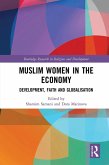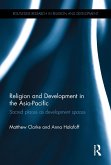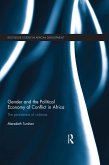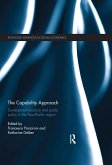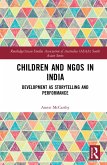Muslim Women in the Economy (eBook, PDF)
Development, Faith and Globalisation
Redaktion: Samani, Shamim; Marinova, Dora
41,95 €
41,95 €
inkl. MwSt.
Sofort per Download lieferbar

21 °P sammeln
41,95 €
Als Download kaufen

41,95 €
inkl. MwSt.
Sofort per Download lieferbar

21 °P sammeln
Jetzt verschenken
Alle Infos zum eBook verschenken
41,95 €
inkl. MwSt.
Sofort per Download lieferbar
Alle Infos zum eBook verschenken

21 °P sammeln
Muslim Women in the Economy (eBook, PDF)
Development, Faith and Globalisation
Redaktion: Samani, Shamim; Marinova, Dora
- Format: PDF
- Merkliste
- Auf die Merkliste
- Bewerten Bewerten
- Teilen
- Produkt teilen
- Produkterinnerung
- Produkterinnerung

Bitte loggen Sie sich zunächst in Ihr Kundenkonto ein oder registrieren Sie sich bei
bücher.de, um das eBook-Abo tolino select nutzen zu können.
Hier können Sie sich einloggen
Hier können Sie sich einloggen
Sie sind bereits eingeloggt. Klicken Sie auf 2. tolino select Abo, um fortzufahren.

Bitte loggen Sie sich zunächst in Ihr Kundenkonto ein oder registrieren Sie sich bei bücher.de, um das eBook-Abo tolino select nutzen zu können.
This book explores the changing role of Muslim women in the economy in the twenty first century.
- Geräte: PC
- ohne Kopierschutz
- eBook Hilfe
- Größe: 6.3MB
Andere Kunden interessierten sich auch für
![Muslim Women in the Economy (eBook, ePUB) Muslim Women in the Economy (eBook, ePUB)]() Muslim Women in the Economy (eBook, ePUB)41,95 €
Muslim Women in the Economy (eBook, ePUB)41,95 €![Religion and Urbanism (eBook, PDF) Religion and Urbanism (eBook, PDF)]() Religion and Urbanism (eBook, PDF)45,95 €
Religion and Urbanism (eBook, PDF)45,95 €![Religion and Development in the Asia-Pacific (eBook, PDF) Religion and Development in the Asia-Pacific (eBook, PDF)]() Matthew ClarkeReligion and Development in the Asia-Pacific (eBook, PDF)38,95 €
Matthew ClarkeReligion and Development in the Asia-Pacific (eBook, PDF)38,95 €![Gender and the Political Economy of Conflict in Africa (eBook, PDF) Gender and the Political Economy of Conflict in Africa (eBook, PDF)]() Meredeth TurshenGender and the Political Economy of Conflict in Africa (eBook, PDF)48,95 €
Meredeth TurshenGender and the Political Economy of Conflict in Africa (eBook, PDF)48,95 €![The Capability Approach (eBook, PDF) The Capability Approach (eBook, PDF)]() The Capability Approach (eBook, PDF)51,95 €
The Capability Approach (eBook, PDF)51,95 €![The Political Ecology of Climate Change Adaptation (eBook, PDF) The Political Ecology of Climate Change Adaptation (eBook, PDF)]() Marcus TaylorThe Political Ecology of Climate Change Adaptation (eBook, PDF)49,95 €
Marcus TaylorThe Political Ecology of Climate Change Adaptation (eBook, PDF)49,95 €![Children and NGOs in India (eBook, PDF) Children and NGOs in India (eBook, PDF)]() Annie McCarthyChildren and NGOs in India (eBook, PDF)39,95 €
Annie McCarthyChildren and NGOs in India (eBook, PDF)39,95 €-
-
-
This book explores the changing role of Muslim women in the economy in the twenty first century.
Dieser Download kann aus rechtlichen Gründen nur mit Rechnungsadresse in A, B, BG, CY, CZ, D, DK, EW, E, FIN, F, GR, HR, H, IRL, I, LT, L, LR, M, NL, PL, P, R, S, SLO, SK ausgeliefert werden.
Produktdetails
- Produktdetails
- Verlag: Taylor & Francis eBooks
- Seitenzahl: 254
- Erscheinungstermin: 27. März 2020
- Englisch
- ISBN-13: 9780429553776
- Artikelnr.: 58951762
- Verlag: Taylor & Francis eBooks
- Seitenzahl: 254
- Erscheinungstermin: 27. März 2020
- Englisch
- ISBN-13: 9780429553776
- Artikelnr.: 58951762
- Herstellerkennzeichnung Die Herstellerinformationen sind derzeit nicht verfügbar.
Shamim Samani is a research fellow at the University of Western Australia and a lecturer at Curtin University, Australia. Dora Marinova is a professor of Sustainability at the Curtin University Sustainability Policy (CUSP) Institute, Australia.
Introduction Part 1 Gender Policies and Economic Participation 1.
Progressing in a Man's World: Women's Workforce Participation in Bangladesh
2. Gender Parity through the Saudi Vision 2030: Female Representation in
English as a Foreign Language Textbooks 3. Cultural Assimilation Policies
in Bulgaria and the Plight of Muslim Women 4. 'Leaving No One Behind':
Analysing Contexts of Education and Economic Challenges for Muslim Women in
Northern Nigeria 5. What Hides Behind the Scarf: Iranian Women's
Participation in the Economy Part 2 Negotiating the Workplace 6. Narratives
of Empowerment: Female Domestic Workers in Karachi 7. Mediating between the
Secular and the Religious: Strategies of Prominent Spanish Women of
Moroccan Muslim Origins 8. Multilayered Workplace Discrimination Faced by
Muslim Women in a Western Context 9. Being a Muslim Working Woman:
Experiences of Australian Women of Pakistan Origin 10. A Quest for Balance:
Analyzing Layers of Consciousness Beneath a Muslim Woman's Career Decisions
Part 3 Opportunities in the Global Economy 11. Islamic Finance and
Women-Focused Banking in Kenya 12. The Influence of Religion on the
Empowerment and Economic Mobility of Smallholder Women Dairy Farmers in
Nigeria 13. Education, Digital Enterprise and Islam in the Indonesian
Modern Embedded Economy Conclusion Muslim Women in the Economy: Looking
Towards the Future
Progressing in a Man's World: Women's Workforce Participation in Bangladesh
2. Gender Parity through the Saudi Vision 2030: Female Representation in
English as a Foreign Language Textbooks 3. Cultural Assimilation Policies
in Bulgaria and the Plight of Muslim Women 4. 'Leaving No One Behind':
Analysing Contexts of Education and Economic Challenges for Muslim Women in
Northern Nigeria 5. What Hides Behind the Scarf: Iranian Women's
Participation in the Economy Part 2 Negotiating the Workplace 6. Narratives
of Empowerment: Female Domestic Workers in Karachi 7. Mediating between the
Secular and the Religious: Strategies of Prominent Spanish Women of
Moroccan Muslim Origins 8. Multilayered Workplace Discrimination Faced by
Muslim Women in a Western Context 9. Being a Muslim Working Woman:
Experiences of Australian Women of Pakistan Origin 10. A Quest for Balance:
Analyzing Layers of Consciousness Beneath a Muslim Woman's Career Decisions
Part 3 Opportunities in the Global Economy 11. Islamic Finance and
Women-Focused Banking in Kenya 12. The Influence of Religion on the
Empowerment and Economic Mobility of Smallholder Women Dairy Farmers in
Nigeria 13. Education, Digital Enterprise and Islam in the Indonesian
Modern Embedded Economy Conclusion Muslim Women in the Economy: Looking
Towards the Future
Introduction Part 1 Gender Policies and Economic Participation 1.
Progressing in a Man's World: Women's Workforce Participation in Bangladesh
2. Gender Parity through the Saudi Vision 2030: Female Representation in
English as a Foreign Language Textbooks 3. Cultural Assimilation Policies
in Bulgaria and the Plight of Muslim Women 4. 'Leaving No One Behind':
Analysing Contexts of Education and Economic Challenges for Muslim Women in
Northern Nigeria 5. What Hides Behind the Scarf: Iranian Women's
Participation in the Economy Part 2 Negotiating the Workplace 6. Narratives
of Empowerment: Female Domestic Workers in Karachi 7. Mediating between the
Secular and the Religious: Strategies of Prominent Spanish Women of
Moroccan Muslim Origins 8. Multilayered Workplace Discrimination Faced by
Muslim Women in a Western Context 9. Being a Muslim Working Woman:
Experiences of Australian Women of Pakistan Origin 10. A Quest for Balance:
Analyzing Layers of Consciousness Beneath a Muslim Woman's Career Decisions
Part 3 Opportunities in the Global Economy 11. Islamic Finance and
Women-Focused Banking in Kenya 12. The Influence of Religion on the
Empowerment and Economic Mobility of Smallholder Women Dairy Farmers in
Nigeria 13. Education, Digital Enterprise and Islam in the Indonesian
Modern Embedded Economy Conclusion Muslim Women in the Economy: Looking
Towards the Future
Progressing in a Man's World: Women's Workforce Participation in Bangladesh
2. Gender Parity through the Saudi Vision 2030: Female Representation in
English as a Foreign Language Textbooks 3. Cultural Assimilation Policies
in Bulgaria and the Plight of Muslim Women 4. 'Leaving No One Behind':
Analysing Contexts of Education and Economic Challenges for Muslim Women in
Northern Nigeria 5. What Hides Behind the Scarf: Iranian Women's
Participation in the Economy Part 2 Negotiating the Workplace 6. Narratives
of Empowerment: Female Domestic Workers in Karachi 7. Mediating between the
Secular and the Religious: Strategies of Prominent Spanish Women of
Moroccan Muslim Origins 8. Multilayered Workplace Discrimination Faced by
Muslim Women in a Western Context 9. Being a Muslim Working Woman:
Experiences of Australian Women of Pakistan Origin 10. A Quest for Balance:
Analyzing Layers of Consciousness Beneath a Muslim Woman's Career Decisions
Part 3 Opportunities in the Global Economy 11. Islamic Finance and
Women-Focused Banking in Kenya 12. The Influence of Religion on the
Empowerment and Economic Mobility of Smallholder Women Dairy Farmers in
Nigeria 13. Education, Digital Enterprise and Islam in the Indonesian
Modern Embedded Economy Conclusion Muslim Women in the Economy: Looking
Towards the Future

